The 2020 Mac Mini Unleashed: Putting Apple Silicon M1 To The Test
by Andrei Frumusanu on November 17, 2020 9:00 AM ESTBenchmarks: Whatever Is Available
As we’ve had very little time with the Mac mini, and the fact that this not only is a macOS system, but a new Arm64-based macOS system, our usual benchmark choices that we tend to use aren’t really available to us. We’ve made due with a assortment of available tests at the time of the launch to give us a rough idea of the performance:
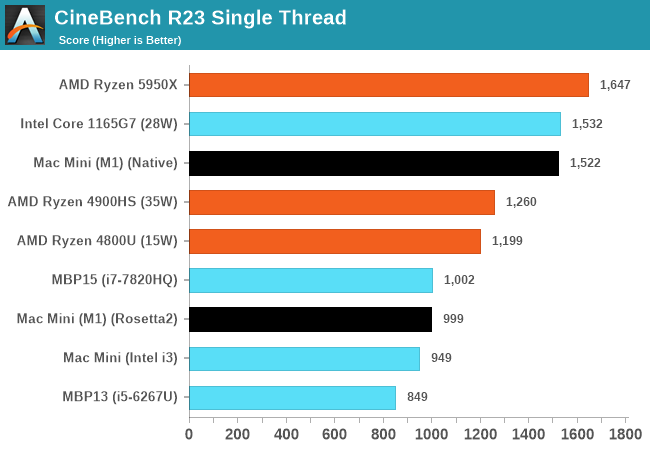
One particular benchmark that sees the first light of day on macOS as well as Apple Silicon is Cinebench. In this first-time view of the popular Cinema4D based benchmark, we see the Apple M1 toe-to-toe with the best-performing x86 CPUs on the market, vastly outperforming past Apple iterations of Intel silicon. The M1 here loses out to Zen3 and Tiger Lake CPUs, which still seem to have an advantage, although we’re not sure of the microarchitectural characteristics of the new benchmark.
What’s notable is the performance of the Rosetta2 run of the benchmark when in x86 mode, which is not only able to keep up with past Mac iterations but still also beat them.
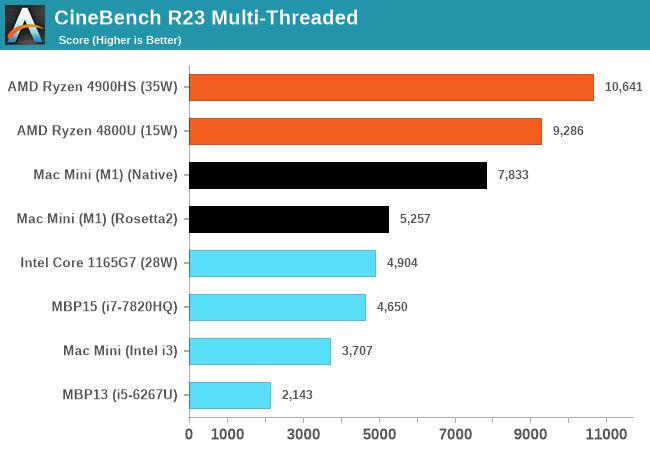
In the multi-threaded R23 runs, the M1 absolutely dominates past Macs with similar low-power CPUs. Just as of note, we’re trying to gather more data on other systems as we have access to them, and expand the graph in further updates of the article past publishing.
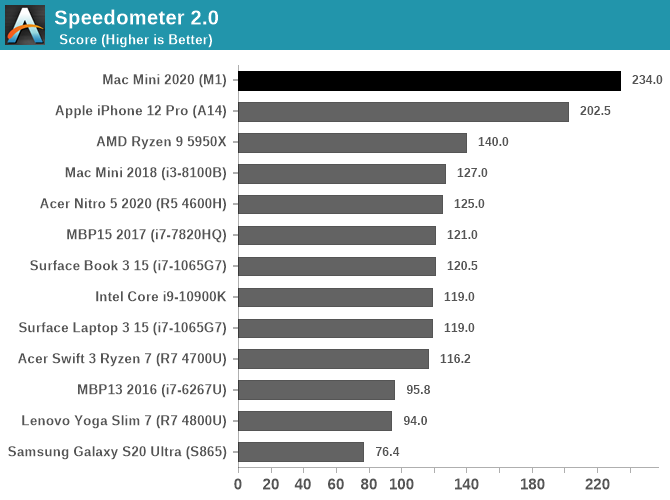
In browser-benchmarks we’ve known Apple’s CPUs to very much dominate across the landscape, but there were doubts as to whether this was due to the CPUs themselves in the iPhone or rather just the browsers and browser engines. Now running on macOS and desktop Safari, being able to compare data to other Intel Mac systems, we can come to the conclusion that the performance advantage is due to Apple’s CPU designs.
Web-browsing performance seems to be an extremely high priority for Apple’s CPU, and this makes sense as it’s the killer workload for mobile SoCs and the workload that one uses the most in everyday life.
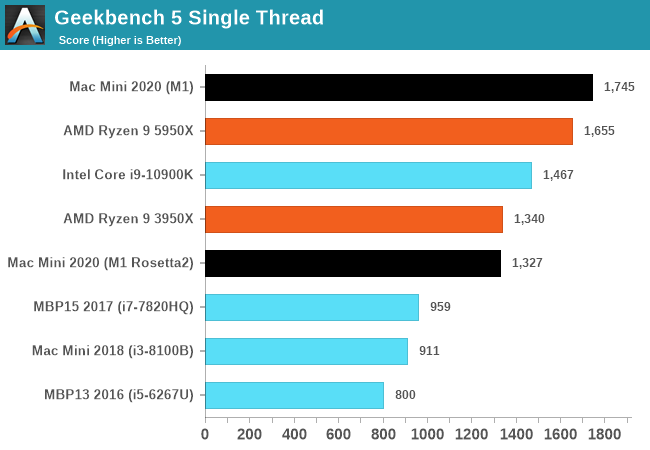
In Geekbench 5, the M1 does again extremely well as it actually takes the lead in our performance figures. Even when running in x86 compatibility mode, the M1 is able to match the top single-threaded performance of last generation’s high-end CPUs, and vastly exceed that of past iterations of the Mac mini and past Macbooks.
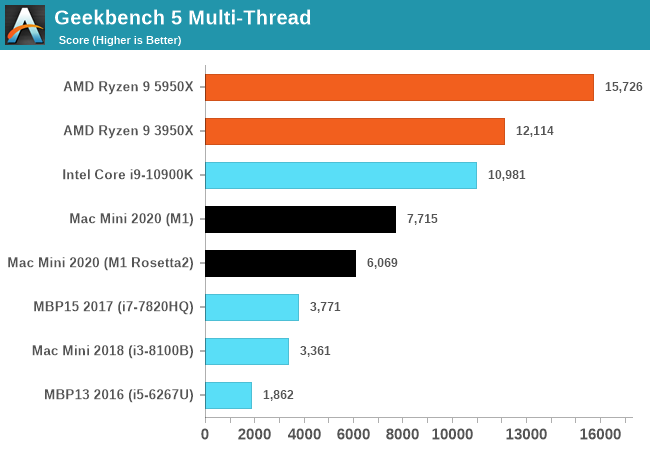
Multi-threaded performance is a matter of core-count and power efficiency of a design. The M1 here demolishes a 2017 15-inch Macbook Pro with an Intel i7-7820HQ with 4 cores and 8 threads, posting over double the score. We’ll be adding more data-points as we collect them.


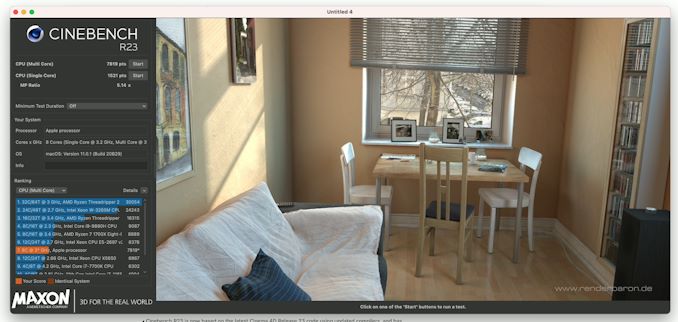








682 Comments
View All Comments
sfwineguy - Wednesday, November 18, 2020 - link
Andrei and Ryan (or others who have seen tests) - any insight yet into how much the M1 equipped machines benefit from 16GB vs 8GB of RAM? Traditionally Apple has certainly seemed to do a better job with less RAM than others in either the Intel or ARM worlds (and they certainly position themselves that way); I'm curious as to whether my typical impulse to buy the upgrade is justified even less now. I have seen plenty of commenters in many places weigh in on this, but they are all just generalizing from past experiences; I have not yet seen anyone test loads and compare. Thanks for a great and fast look at the M1 stuff, esp combined with Andrei's other article on the SOCs.Steven Choi 4321 - Wednesday, November 18, 2020 - link
I see Intel and Amd as Blackberry and Nokia in back of the days. X86 chips like cooking burners. It getting worse and worse no matter what they trying to sell.krakennuts - Thursday, November 19, 2020 - link
except that Blackberry used an ARM processor after switching from Intel, hmmmmmdriftmeyer - Saturday, November 21, 2020 - link
AMD's power consumption gets more and more energy efficient with each Zen release. Intel, the exact opposite.kkromm - Wednesday, November 18, 2020 - link
2018 mac mini 4 thunderbolt and 2 USB 2020 mac mini 2 thunderbolt ports, that's it. Completely uselessAlistair - Thursday, November 19, 2020 - link
no, it has 2 thunderbolt and 2 usb portsmdriftmeyer - Saturday, November 21, 2020 - link
The latest Mac Mini Intel has 4 TB 3 ports and 2 USB ports. Just read their specs.https://en.wikipedia.org/wiki/Mac_Mini#Fourth_gene...
4× Thunderbolt 3 (USB-C 3.1 Gen 2)
2× USB 3.0 Type-A
HDMI 2.0
3.5 mm headphone jack
2020 M1
2× Thunderbolt 3 (USB-C 4)
2× USB 3.0 Type-A
HDMI 2.0
3.5 mm headphone jack
Note: The lack of HDM 2.1 in 2020, and the lack of Thunderbolt 4. Why? It requires Intel VT-d baesd DRM and PCIe 32Gb/s and min PC speed requirements of 40Gb/s. Apple is capping Thunderbolt at 3. TB 4 also requires PC charging on one of the ports. That's another area Apple knows their reduced Power solution would have to jump up quite a bit to provide support on.
blackcrayon - Friday, November 20, 2020 - link
If you're a bot, you probably need your algorithm patched for the word "useless".tomInCanada2020 - Thursday, November 19, 2020 - link
In terms of the overall performance, another consideration about the potential for the M1 to see even greater real world application performance is that SpecInt and FP stress the integer and floating point performance of the chip. Useful but does not necessarily tell the full story where the additional on chip accelerators for machine learning, neural engine, ISP, video encode/decode etc... come into play.I can only imagine that in real world application workloads where developers utilize apples core libraries such as CoreML, CoreImage, CoreMedia etc... that performance would be even better and more in favour of the M1 SoC design when compared with traditional x86 silicon.
When you factor in that the chip does all this AND manages to do it on a skimpy power budget.... mind. Blown!!
I’m really hoping that this move lights a fire under Microsoft and Qualcomm to get a more aggressive performing solution to the Surface Pro X out the door!
lucam - Thursday, November 19, 2020 - link
The M1 with the PowerVR Series A GPU is a real killer! Look fwd to M1X!